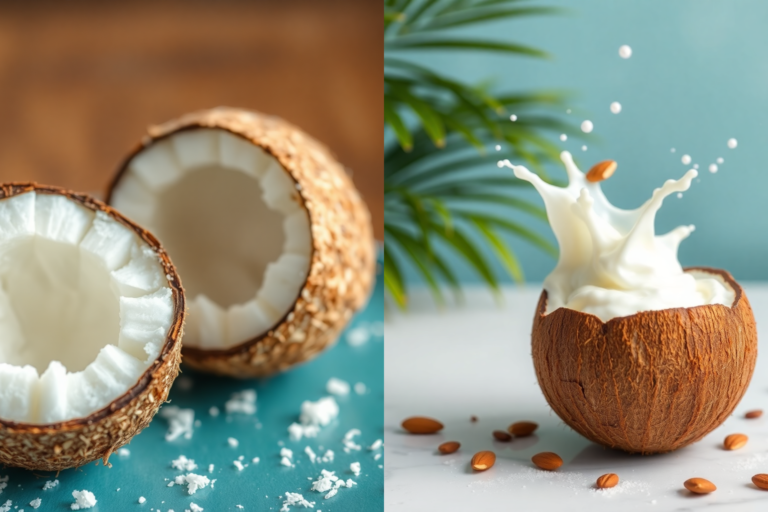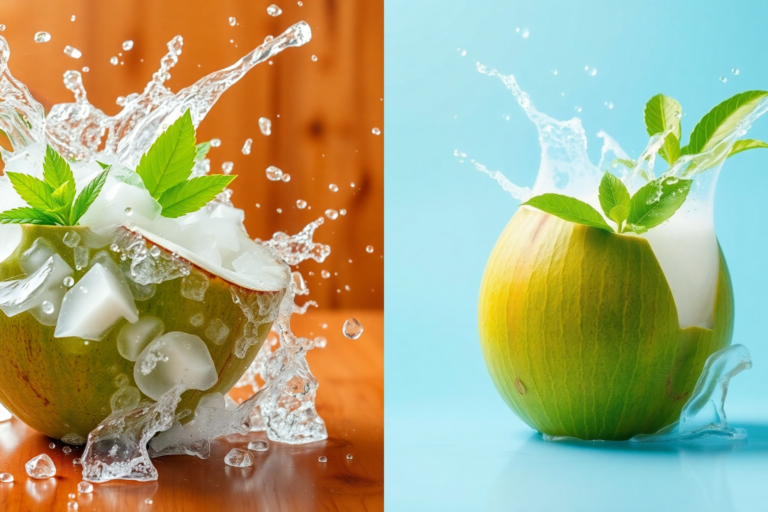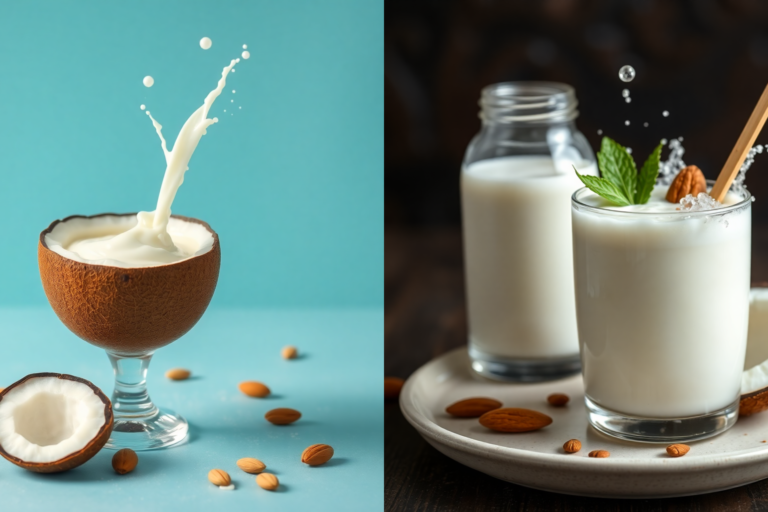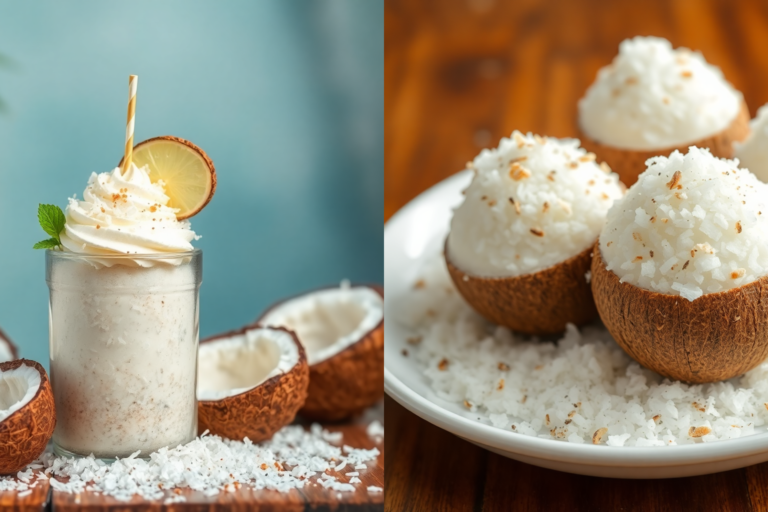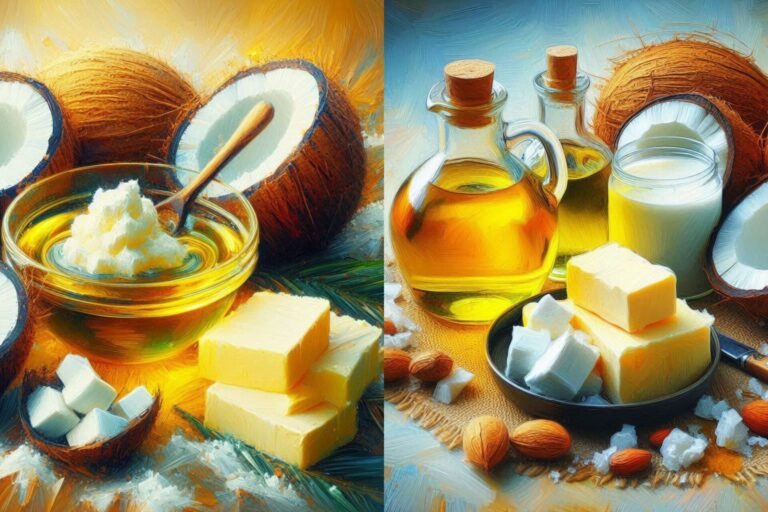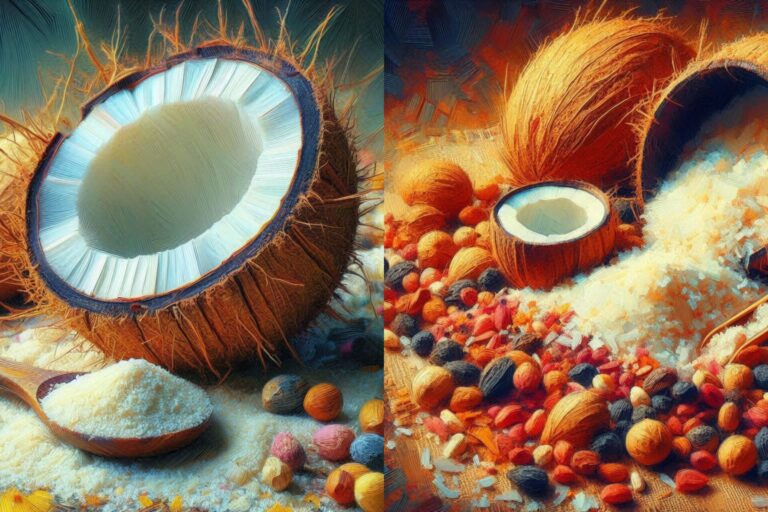Coconut Cream Uses: A Rich and Versatile Ingredient for Cooking
What is Coconut Cream Uses? A Brief Overview
Coconut cream is a thick, rich, and creamy extract derived from mature coconuts. It is made by blending the white flesh of coconuts with water and then straining it to achieve a luxuriously smooth texture. Unlike coconut milk, which has a thinner consistency, coconut cream is denser and more concentrated, making it an excellent ingredient for both sweet and savory dishes.
With its naturally creamy texture and subtle sweetness, coconut cream is widely used in global cuisines, including Thai, Indian, Caribbean, and even Western dishes. Whether you are making a delicious curry, a rich dessert, or a dairy-free alternative for sauces, coconut cream offers a unique flavor and texture that enhances any recipe.
Why Coconut Cream Uses is a Versatile Ingredient in Cooking
One of the biggest advantages of coconut cream is its incredible versatility. It can be used in a variety of cooking applications, from thickening soups to creating dairy-free whipped toppings. Whether you’re looking for a creamy base for curries, a rich addition to baked goods, or a way to elevate your coffee, coconut cream seamlessly blends into recipes while providing a luxurious consistency.
Ways to Use Coconut Cream in Cooking:
- Creamy Curries and Sauces – Adds a smooth, velvety texture to Thai and Indian curries.
- Decadent Desserts – Ideal for making coconut cream pies, puddings, and dairy-free whipped cream.
- Rich Soups and Stews – Enhances creamy soups like pumpkin and butternut squash.
- Smoothies and Beverages – Blends well into milkshakes, tropical cocktails, and even coffee.
- Dairy-Free Baking – A perfect substitute for heavy cream in muffins, scones, and cakes.
No matter how you use it, coconut cream serves as an essential ingredient in both everyday and gourmet cooking.
Health Benefits and Dietary Advantages of Coconut Cream Uses
Beyond its culinary uses, coconut cream is also known for its impressive health benefits. It is a natural source of healthy fats, particularly medium-chain triglycerides (MCTs), which are quickly absorbed by the body and provide a quick source of energy.
Key Health Benefits of Coconut Cream:
- Dairy-Free & Vegan-Friendly – Coconut cream is a perfect alternative for those who are lactose-intolerant or following a vegan diet.
- Rich in Healthy Fats – The MCTs in coconut cream can support metabolism and provide sustained energy.
- Promotes Heart Health – Some studies suggest that the healthy fats in coconut cream may help maintain good cholesterol levels.
- Supports Digestion – Coconut cream contains natural antimicrobial properties that can promote gut health.
- Enhances Satiety – Due to its rich fat content, coconut cream can help keep you feeling full for longer.
Why Choose Coconut Cream for a Healthy Lifestyle?
If you’re looking for a nutrient-dense ingredient that not only enhances the taste of your dishes but also provides health benefits, coconut cream is a fantastic option. Whether you are on a plant-based diet, trying to reduce dairy intake, or simply looking for a delicious and healthy addition to your meals, coconut cream can be an excellent choice.
Coconut Cream Uses in Creamy Curries and Sauces
Enhancing Thai, Indian, and Other Flavorful Curries with Coconut Cream
Coconut cream is a game-changer when it comes to making rich, creamy, and flavorful curries. Its thick, velvety consistency enhances the depth of flavors in a variety of global cuisines. Whether you’re preparing a spicy Thai curry, a comforting Indian dish, or a bold Caribbean-inspired recipe, coconut cream provides the perfect balance of richness and subtle sweetness.
Why Use Coconut Cream in Curries?
- Creamy Texture: The high-fat content of coconut cream creates a luxuriously thick and smooth texture in curries.
- Flavor Enhancer: Coconut cream absorbs and complements strong spices like turmeric, cumin, coriander, and chili.
- Dairy-Free Alternative: Perfect for those who are lactose intolerant or following a vegan diet, coconut cream is an excellent replacement for heavy cream or yogurt in traditional curry recipes.
Best Coconut Cream Curries to Try
- Thai Red or Green Curry – Simmering vegetables, tofu, or chicken in a spicy curry paste with coconut cream results in a fragrant and flavorful dish.
- Indian Coconut Chicken Curry – A creamy, mildly spiced dish that blends coconut cream with aromatic spices like garam masala and ginger.
- Caribbean Coconut Curry – This curry, often made with seafood or plantains, relies on coconut cream for its distinctive tropical richness.
Using Coconut Cream for Rich, Velvety Pasta Sauces
Beyond curries, coconut cream is an exceptional ingredient for creating luscious, dairy-free pasta sauces. The smooth consistency of coconut cream helps coat pasta evenly, making every bite indulgent and satisfying.
Why Choose Coconut Cream for Pasta Sauces?
- Silky Consistency: Unlike traditional dairy-based sauces, coconut cream maintains a rich, creamy texture without feeling heavy.
- Subtle Sweetness: The natural sweetness of coconut cream pairs beautifully with garlic, herbs, and spices, enhancing the overall flavor.
- Vegan & Dairy-Free: Replacing heavy cream or cheese-based sauces with coconut cream makes pasta dishes suitable for a plant-based diet.
Best Coconut Cream Pasta Sauces to Try
- Coconut Garlic Alfredo Sauce – A creamy, garlicky delight that combines coconut cream with nutritional yeast for a dairy-free alternative to Alfredo sauce.
- Spicy Coconut Tomato Sauce – A fusion of tangy tomatoes, chili flakes, and coconut cream, perfect for pasta and seafood dishes.
- Creamy Pesto Coconut Sauce – A vibrant mix of basil, nuts, and coconut cream that delivers a unique, rich flavor to pasta.
Decadent Desserts and Baked Goods with Coconut Cream
Coconut cream is a game-changer in the world of desserts and baked goods. Its rich, velvety texture and naturally sweet flavor make it a perfect ingredient for cakes, pies, and puddings. Whether you’re whipping up a classic coconut cream pie or creating a moist, dairy-free cake, coconut cream enhances every bite with its luxurious consistency.
Coconut Cream in Cakes: Moist and Flavorful Creations
Coconut cream is a secret ingredient that transforms cakes into moist, rich, and flavorful treats. Unlike traditional dairy-based creams, coconut cream adds a subtle tropical note while keeping cakes soft and tender. It works exceptionally well in:
- Coconut Cream Layer Cakes – Adds moisture and a delicate coconut flavor to layered cakes.
- Vegan and Dairy-Free Cakes – Replaces heavy cream for a rich yet plant-based alternative.
- Coconut Cream Chocolate Cake – Enhances the density and fudgy texture of chocolate-based cakes.
To use coconut cream in cakes, substitute it for milk or heavy cream in the batter. It also makes an excellent base for dairy-free frosting, adding a creamy and smooth consistency to frostings or fillings.
Coconut Cream Pies: The Ultimate Indulgence
A classic coconut cream pie is a must-try for dessert lovers. Coconut cream is the key ingredient in creating a silky, luscious pie filling that pairs perfectly with a buttery crust. The process involves:
- Cooking the Coconut Cream Filling – Thickened with cornstarch or egg yolks for a rich, custard-like consistency.
- Layering Over a Pie Crust – Poured into a pre-baked crust and left to set.
- Topping with Coconut Cream Whipped Cream – Whipped coconut cream makes a light, dairy-free topping.
Coconut cream pies can be further elevated with toasted coconut flakes, adding a delightful crunch to the creamy filling.
Creamy Coconut Cream Puddings: Smooth and Velvety
Coconut cream is ideal for making smooth and indulgent puddings. It thickens naturally when chilled, creating a luxurious texture in:
- Coconut Cream Chia Pudding – A healthy, dairy-free dessert with a rich coconut base.
- Coconut Cream Rice Pudding – Adds extra creaminess to traditional rice pudding.
- Chocolate Coconut Cream Pudding – A rich, decadent dessert with a tropical twist.
For the best results, coconut cream can be combined with natural sweeteners like honey, maple syrup, or coconut sugar to enhance its flavor.
Baking with Coconut Cream: Soft and Moist Treats
Coconut cream is an excellent dairy-free alternative in various baked goods. It keeps muffins, scones, and breads moist without the need for butter or milk. Some top coconut cream-based baked goods include:
- Coconut Cream Muffins – Light, fluffy, and full of tropical flavor.
- Coconut Cream Scones – Buttery and rich with a soft texture.
- Coconut Cream Banana Bread – Extra moist and naturally sweet.
Adding coconut cream to baked goods improves their shelf life, keeping them fresh and soft for longer.
Smooth and Creamy Beverages: Elevate Your Drinks with Coconut Cream
Coconut cream is the secret ingredient that can transform any drink into a smooth, velvety indulgence. Whether you’re blending up a tropical smoothie, stirring a milkshake, or crafting a delicious cocktail, coconut cream adds a rich, creamy texture and a hint of tropical flavor that’s simply irresistible. Below, we explore some of the best ways to incorporate coconut cream into your beverages.
Tropical Smoothies and Milkshakes with Coconut Cream
One of the easiest and most delicious ways to enjoy coconut cream is by adding it to smoothies and milkshakes. The natural thickness and sweetness of coconut cream make it a perfect base for tropical fruit blends. Whether you’re creating a refreshing smoothie or a rich milkshake, coconut cream brings a satisfying creaminess that’s ideal for dairy-free and vegan recipes.
Tropical Smoothie: Combine coconut cream with fruits like mango, pineapple, and banana for a refreshing smoothie. The coconut cream enhances the natural sweetness of the fruit and gives your smoothie a luxurious, velvety texture. You can also add a bit of coconut water for extra hydration and a tropical twist.
Coconut Cream Milkshake: For a more indulgent treat, try a coconut cream milkshake. Simply blend coconut cream with ice cream (or a dairy-free alternative), your favorite sweetener, and a pinch of vanilla for a creamy, dreamy drink that will have you feeling like you’re on vacation. You can even sprinkle some shredded coconut on top for an extra touch of tropical flair.
Creamy Cocktails and Coconut Cream Coffee Drinks
Coconut cream isn’t just for smoothies and milkshakes; it’s also a fantastic addition to cocktails and coffee drinks. The smooth, rich texture of coconut cream gives a luxurious mouthfeel to any drink, making it a perfect ingredient for both alcoholic and non-alcoholic beverages.
Coconut Cream Cocktails: One of the most popular cocktails featuring coconut cream is the Piña Colada. By blending coconut cream with rum, pineapple juice, and crushed ice, you’ll have a tropical drink that’s both creamy and refreshing. You can also experiment with other flavors like adding coconut cream to a tropical mojito or a coconut margarita for a creamy twist on these classic cocktails.
Coconut Cream Coffee Drinks: If you’re a fan of coffee drinks, coconut cream is a great way to create dairy-free lattes and iced coffees with a rich and creamy texture. For a simple yet indulgent treat, blend hot coffee with coconut cream for a dairy-free latte that’s perfect for any time of day. You can also make a coconut cream iced coffee by combining cold brew coffee, ice, and coconut cream for a refreshing, creamy pick-me-up.
Why Coconut Cream is the Ultimate Beverage Ingredient
Coconut cream’s versatility doesn’t stop at smoothies and cocktails—it can truly elevate any beverage. Its thick and rich texture helps create smooth, creamy drinks that are perfect for those seeking a dairy-free or vegan option. Coconut cream’s mild, slightly sweet flavor pairs well with a variety of ingredients, from fruits to coffee, and can add a luxurious touch to any drink. Whether you’re blending a tropical smoothie, shaking up a cocktail, or crafting a coffee drink, coconut cream brings richness and smoothness that will make your beverages truly unforgettable.
Introduction to Coconut Cream in Soups and Stews
Coconut cream is a game-changer when it comes to enhancing the texture and flavor of soups and stews. Its rich, velvety consistency adds a depth of creaminess that can elevate your favorite dishes. Whether you’re making a warm, comforting soup or a hearty stew, coconut cream brings both richness and a subtle coconut flavor that complements a wide range of ingredients.
The Role of Coconut Cream in Soups
Coconut cream is an excellent ingredient to incorporate into your soup recipes. When added to a soup, it creates a velvety, smooth texture that enhances the overall mouthfeel, making each spoonful indulgent and satisfying. Coconut cream is especially ideal for creamy soups like pumpkin, butternut squash, or Thai coconut soup. It blends seamlessly into the soup base, thickening the broth without overpowering the natural flavors of the vegetables and spices.
For example, in a Thai coconut soup, coconut cream adds a rich and luxurious base that pairs perfectly with aromatic herbs like lemongrass, kaffir lime leaves, and galangal. The creaminess of coconut cream helps to balance the heat from chili peppers, creating a harmonious soup with both richness and spice.
Thickening Stews with Coconut Cream
When it comes to hearty stews, coconut cream is an essential ingredient for achieving that thick, satisfying texture. Adding coconut cream to stews gives them a velvety, luxurious consistency, while also enhancing the flavor profile. Whether you’re making a vegetable stew, a chicken stew, or a lamb curry, coconut cream helps to bring the dish together.
Coconut cream works as a natural thickener, so you don’t need to rely on flour or cornstarch to achieve that perfect stew consistency. Simply stir in a generous amount of coconut cream and let it simmer with the stew to create a luscious, hearty dish. The creaminess from coconut cream balances out the spices and intensifies the flavors, making every bite mouthwatering and satisfying.
Perfect for Velvety Bisques and Chowders
Coconut cream is a must-have ingredient for making bisques and chowders that are rich and full of flavor. Bisques, typically made with seafood, are known for their velvety smooth texture, and coconut cream plays a crucial role in achieving this. When combined with fresh shellfish or fish, coconut cream adds both body and richness to the broth, giving the bisque a silky finish.
Similarly, chowders benefit greatly from the addition of coconut cream. Classic clam chowder or corn chowder becomes even more indulgent with coconut cream, making them feel more comforting and luxurious. The cream helps to thicken the chowder while adding a subtle coconut flavor that complements the other ingredients.
Dairy-Free Alternative in Cooking: How Coconut Cream Transforms Your Dishes
Coconut cream is a versatile and rich ingredient that serves as a perfect dairy-free alternative in cooking. Whether you’re preparing savory dishes, desserts, or beverages, coconut cream can replace traditional dairy products with a creamy texture and subtle coconut flavor. Not only is it a great option for those who are lactose intolerant or vegan, but it also provides numerous health benefits, including healthy fats and a natural source of hydration.
1. Replacing Dairy in Whipped Cream
One of the best uses of coconut cream is as a replacement for whipped cream. To make a dairy-free whipped cream, simply chill a can of coconut cream in the fridge for a few hours. Once chilled, scoop out the solidified cream, leaving the liquid behind, and whip it with a hand mixer until fluffy. Add a little powdered sugar and vanilla extract for a sweetened version, perfect for topping desserts like cakes, pies, or fresh fruit.
Using coconut cream in place of dairy cream offers a rich and creamy texture without the need for animal products. This is an excellent option for those following a vegan or dairy-free diet, allowing you to enjoy your favorite treats without compromising on taste or texture.
2. Dairy-Free Coffee Creamer
For coffee lovers, coconut cream makes a fantastic alternative to heavy cream or milk. It adds a luxurious, velvety texture to your coffee, with a hint of coconut flavor that enhances the richness. Simply stir in a spoonful of coconut cream into your hot coffee, or blend it for a frothy, dairy-free cappuccino. It’s also great in iced coffee or smoothies, making it a versatile ingredient to keep on hand for all your morning beverages.
Whether you’re making an iced latte, chai latte, or simply want to elevate your coffee experience, coconut cream is a creamy, non-dairy option that fits seamlessly into your daily routine.
3. Savory Dishes with Coconut Cream
Coconut cream isn’t just for sweets and drinks; it’s also an excellent ingredient for savory dishes. It can replace heavy cream or milk in soups, curries, and sauces, adding a rich texture and subtle coconut flavor that enhances the overall taste. For instance, coconut cream can be used in creamy curries, such as Thai red curry or Indian coconut chicken curry, giving the dish a silky smooth consistency.
In addition to curries, coconut cream is a great addition to vegan and dairy-free sauces. It can be used to make a creamy coconut garlic sauce, perfect for pasta dishes or as a topping for roasted vegetables. When cooking savory dishes, coconut cream not only provides a dairy-free alternative but also contributes healthy fats, making your meals more satisfying and nourishing.
4. Vegan-Friendly Cooking Ideas with Coconut Cream
Coconut cream is a fantastic ingredient for vegan-friendly cooking. It can be used in a variety of dishes, from creamy soups to dairy-free desserts. For example, in a savory dish like a coconut curry, you can use coconut cream instead of dairy cream or milk, creating a rich, flavorful dish that everyone will enjoy. It’s also perfect for vegan soups such as coconut pumpkin soup or coconut butternut squash soup.
For desserts, coconut cream is a dream ingredient. It can be used to make rich, creamy coconut milk-based puddings, coconut cream pies, and even vegan coconut ice cream. The beauty of coconut cream lies in its ability to mimic the texture and creaminess of dairy while providing a unique coconut flavor, making it a staple in vegan cooking.






